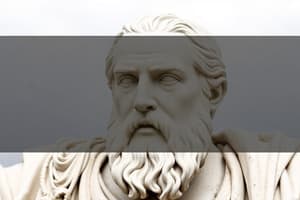Podcast
Questions and Answers
What charges were brought against Socrates during his trial?
What charges were brought against Socrates during his trial?
- Murder and treason
- Encouragement of rebellion and conspiracy
- Theft and bribery
- Refusal to recognize the gods, introducing new divinities, and corrupting the young (correct)
What was one piece of evidence used by Socrates' accusers to support their claims against him?
What was one piece of evidence used by Socrates' accusers to support their claims against him?
- He wrote philosophical treaties
- He was a wealthy landowner
- He frequently hosted lavish parties
- He did not participate in state rituals (correct)
How did Socrates justify following divine signs?
How did Socrates justify following divine signs?
- He thought they were merely coincidences
- He believed they were only for the selected few
- He saw them as a means to manipulate others
- He argued that they provided guidance and warned others (correct)
What did Socrates believe about the gods' knowledge and human understanding?
What did Socrates believe about the gods' knowledge and human understanding?
How did Socrates claim he influenced the youth?
How did Socrates claim he influenced the youth?
What lifestyle choices did Socrates make that reflected his philosophy?
What lifestyle choices did Socrates make that reflected his philosophy?
What did Socrates believe about the sources of true happiness?
What did Socrates believe about the sources of true happiness?
What was Socrates' view on the relationship between knowledge and wisdom?
What was Socrates' view on the relationship between knowledge and wisdom?
What was Socrates' stance on teaching wisdom for money?
What was Socrates' stance on teaching wisdom for money?
How did Socrates perceive the relationship between virtue and self-control?
How did Socrates perceive the relationship between virtue and self-control?
What analogy did Socrates use to explain the concept of pretending to be virtuous?
What analogy did Socrates use to explain the concept of pretending to be virtuous?
What did Socrates believe about the gods' role in human life?
What did Socrates believe about the gods' role in human life?
What did Socrates associate true happiness with?
What did Socrates associate true happiness with?
How did Socrates justify his choice of a simple lifestyle?
How did Socrates justify his choice of a simple lifestyle?
What was Socrates' outlook on friendship?
What was Socrates' outlook on friendship?
How did Socrates react to the accusation of avoiding politics?
How did Socrates react to the accusation of avoiding politics?
What did Socrates think about the pursuit of physical health?
What did Socrates think about the pursuit of physical health?
How did Socrates define true wealth?
How did Socrates define true wealth?
Flashcards
What were the main charges against Socrates in his trial?
What were the main charges against Socrates in his trial?
Socrates was accused of refusing to recognize the gods acknowledged by the state, introducing new divinities, and corrupting the youth.
What evidence did Socrates' accusers provide for the charge of not recognizing the state's gods?
What evidence did Socrates' accusers provide for the charge of not recognizing the state's gods?
Socrates' accusers claimed that he didn't sacrifice or use divination, but in reality, he often engaged in sacrifices and relied on divine signs. He famously said, "A divinity gives me a sign."
How did Socrates justify his reliance on divine signs?
How did Socrates justify his reliance on divine signs?
Socrates believed that the gods communicated through signs, like birds, chance meetings, or entrails, and he gave advice based on those signs. He believed following those signs led to prosperity.
What was Socrates' view on the role of the gods in human affairs?
What was Socrates' view on the role of the gods in human affairs?
Signup and view all the flashcards
How did Socrates respond to the accusation of corrupting the youth?
How did Socrates respond to the accusation of corrupting the youth?
Signup and view all the flashcards
What was Socrates' lifestyle like, and how did it reflect his philosophy?
What was Socrates' lifestyle like, and how did it reflect his philosophy?
Signup and view all the flashcards
How did Socrates view the relationship between wealth and happiness?
How did Socrates view the relationship between wealth and happiness?
Signup and view all the flashcards
What was Socrates' opinion of the value of wisdom and knowledge?
What was Socrates' opinion of the value of wisdom and knowledge?
Signup and view all the flashcards
Socrates' stance on wisdom and money
Socrates' stance on wisdom and money
Signup and view all the flashcards
Socrates' view on simple living
Socrates' view on simple living
Signup and view all the flashcards
Self-control according to Socrates
Self-control according to Socrates
Signup and view all the flashcards
Socrates' use of analogies
Socrates' use of analogies
Signup and view all the flashcards
Socrates' view of divine guidance
Socrates' view of divine guidance
Signup and view all the flashcards
Happiness according to Socrates
Happiness according to Socrates
Signup and view all the flashcards
Socrates' refusal to charge for his teachings
Socrates' refusal to charge for his teachings
Signup and view all the flashcards
Socrates' lifestyle and self-sufficiency
Socrates' lifestyle and self-sufficiency
Signup and view all the flashcards
Socrates' view on friendship
Socrates' view on friendship
Signup and view all the flashcards
Socrates' approach to civic duty
Socrates' approach to civic duty
Signup and view all the flashcards
Study Notes
Socrates' Trial and Philosophy
- Charges against Socrates: Accused of impiety (refusing state-recognized gods) and corrupting youth.
- Impiety charge details: Accusers claimed Socrates didn't follow established religious practices, yet he was seen to engage in sacrifice and used divine signs (e.g., "a divinity gives me a sign").
- Divine signs explanation: Socrates believed the gods communicated through signs (birds, chance encounters, etc.). He advised others based on these signs, arguing that those who followed his advice prospered.
- Socratic view on divine guidance: The gods provide guidance; humans shouldn't try to control matters beyond their understanding.
- Socrates' defense against corrupting youth: He aimed to foster virtue and self-control in youth, believing association with him led to improved moral character.
- Socrates' lifestyle: Simple and frugal, emphasizing self-control as a virtue.
- Wealth and happiness: True happiness comes from self-sufficiency and virtue, not wealth.
- Wisdom and knowledge: Valued wisdom, believed it should be freely shared, not sold as by sophists.
- Response to Antiphon's criticism: His simple lifestyle focused on virtue and self-improvement, leading to a closer connection with the divine.
- Self-control's importance: Crucial to achieving virtue, happiness, and success.
- Teaching method: Used analogies, like comparing a 'fake flute player' to a 'fake virtuous person', to highlight the importance of genuine virtue.
- Importance of divine guidance: Divine guidance crucial for a good life; ignoring it viewed as a form of folly.
- Wisdom and happiness connection: True happiness found in wisdom and self-knowledge.
- Refusal to charge for teaching: Believed wisdom should be freely shared, comparing it to a gift rather than a commodity.
- Self-sufficiency: Simple lifestyle to focus on virtue, wisdom, & a fulfilling life.
- Importance of friendship: Valued friendship and the mutual pursuit of knowledge and virtue.
- Socratic response to lack of political involvement: Teaching virtue and wisdom was a more impactful contribution to society than direct political participation.
- Physical well-being: Physical exercise and health important but should be moderate; focus on moderation.
- Wealth and virtue relationship: Wealth not inherently virtuous nor evil; pursuit potentially distracting from virtue.
Studying That Suits You
Use AI to generate personalized quizzes and flashcards to suit your learning preferences.




